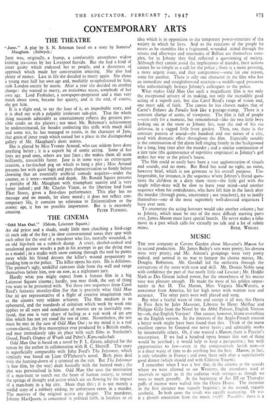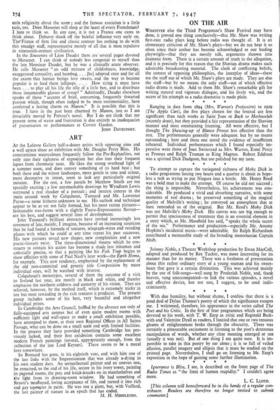MUSIC
THE new company at Covent Garden chose Massenet's Marton for its second production. Mr. James Bailey's sets were pretty; his dresses were very pretty; and Mr. Ashton's groupings were very pretty andeed, and seemed in no way to hamper the chorus master, Mr. Douglas Robinson. Mr. Goodall led the orchestra through the corruptions of the score with taste and skill. Mr. Dennis Noble sang with confidence the part of that nastly little cad Lescaut ; Mr. Heddle Nash as Des Grieux lacked power, but the smoothness of his mezzo voce was pleasant enough. He made the most of his golden oppor- tunity in Act II. The Manon, Miss Virginia MacWatters, a newcomer from America, hit her high notes with wanton ease and accuracy. The other parts were well played and sung.
But what a fearful waste of time and energy it all was, this Opera in Five Acts by Jules Massenet, Libretto by Henri Meilhac and Philippe Gille from the Novel by the Abbe Prevost, English Version by—oh, that English Version! One cannot, however, blame everything on the English version. In the interests of the Anglo-French entente a better work might have been -found than this. Think of the many excellent operas by Gounod one never hears ; and admirable works by innumerable others. Or, if one wanted a Manon, there is Puccini's masterpiece. If we had a hundred opera houses this sort of thing would be justified ; it would help to keep a perspective ; but with !opportunities so few—even in the comparatively lavish now—it is a sheer waste of time to do anything but the best. Manon, in fact, is only tolerable in France ; and even there only after a superlatively good dinner (which should end with Chateau Youem).
I remember when I was a boy that, in the cinema at the seaside where we were allowed to see Westerns,, the attendants used at intervals to squirt us in the audience with syringes as though we were so much greenfly. At the beginning of Act III on Thursday puffs of incense were wafted into the Opera House. The intention in the first instance was vaguely hygienic ; in the second, vaguely aesthetic. In both cases the result was equally nauseating. Or was it a ghostly emanation from the music i-self? Possibly : there is a stale religiosity about the score ; and the famous eroticism is a little stale, too. Does Massenet still sleep at the heart of every Frenchman? I hate to think so. In any case, it is not a France one cares to think about. Debussy shook off the baleful influence very early on. The'France of firm line and classic contour has nothing to do with this smudgy stuff, representative merely of all that is most repulsive in nineteenth-century civilisation.
In the Souvenirs of Leon Daudet there are several pages devoted to Massenet. I can think of nobody less congenial to myself than the late Monsieur Daudet, but he was a clinically acute observer. He calls Massenet "an odd mixture of childishness, knowledge, exaggerated sensuality, and humbug... . [he] adopted once and for all the axiom that human beings love sweets, and the way to become ,popular is to feed them lollipops. . . . How tiring it must have been . . . to play all his life the role of a little boy, and to distribute those innumerable glasses of syrup?" Admittedly, Daudet elsewhere speaks of those "accents of brief, consuming, frequently thwarted passion which, though often judged to be mere sentimentality, have ,conferred a lasting charm on Marion." It is possible that this is true. I have in the past been charmed by Manon, just as I am invariably moved by Prevost's novel. But I do not think that my present sense of waste and frustration is due entirely to inadequacies of presentation or performances at Covent Garden.
JOHN DAVENPORT.



































 Previous page
Previous page